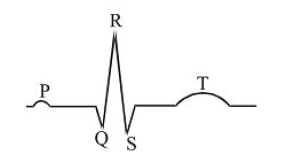The end of T-wave marks the end of
A
Ventricular diastole
B
Ventricular systole
C
Auricular systole
D
Auricular diastole
Video Solution
|
Answer
Step by step video & image solution for The end of T-wave marks the end of by Biology experts to help you in doubts & scoring excellent marks in Class 12 exams.
Updated on:21/07/2023Topper's Solved these Questions
Similar Questions
Knowledge Check
Go through the following statements
(i) Vagus nerve decreases the rate of impulse formation from the SA node and its conduction
(ii) As the human heart is myogenic in nature, the rate of formation and conduction of cariac impulse cannot be changed by the action of nerves
(iii) The end of T-wave in ECG marks the end of systole.
(iv) If the P-wave in ECG is inverted , it indicates that SA node fails to initiate impulse and the atrial muscle depolarises by the impulse originating in A.V. node.
Whic of these are correct ?A(i),(ii) & (iii)B(i),(iii) & (iv)C(ii),(iii) & (v)DAll are correctRead the following statements ( A-C ) about the human heart :
A. The SA node is a specialized mass of cardiac tissue present in the lower-left corner of the right atrium close to the AV septum.
B. The body has the ability to alter the heart rate, cardiac output but not stroke volume.
C. The end of the T- wave in ECG marks the end of the systole.
How Many statements is /are correct from the above?AThreeBTwoCOneDNoneThe end of the T-wave in ECG mark the
Abeginning of Ventricular systoleBend of Ventricular systoleCbeginning of atrial diastoleDend of atrial diastole
In given ECG, end of T-wave marks

View SolutionWhich of the following wave in ECG marks the end of ventricular systole ?
View SolutionThe end of juvenile phase marks the beginning of
View SolutionWhich of the following marks the end of the reproductive phase of a woman's life?
View SolutionWhich of the following marks the end of the reproductive phase of a woman's life?
View Solution
